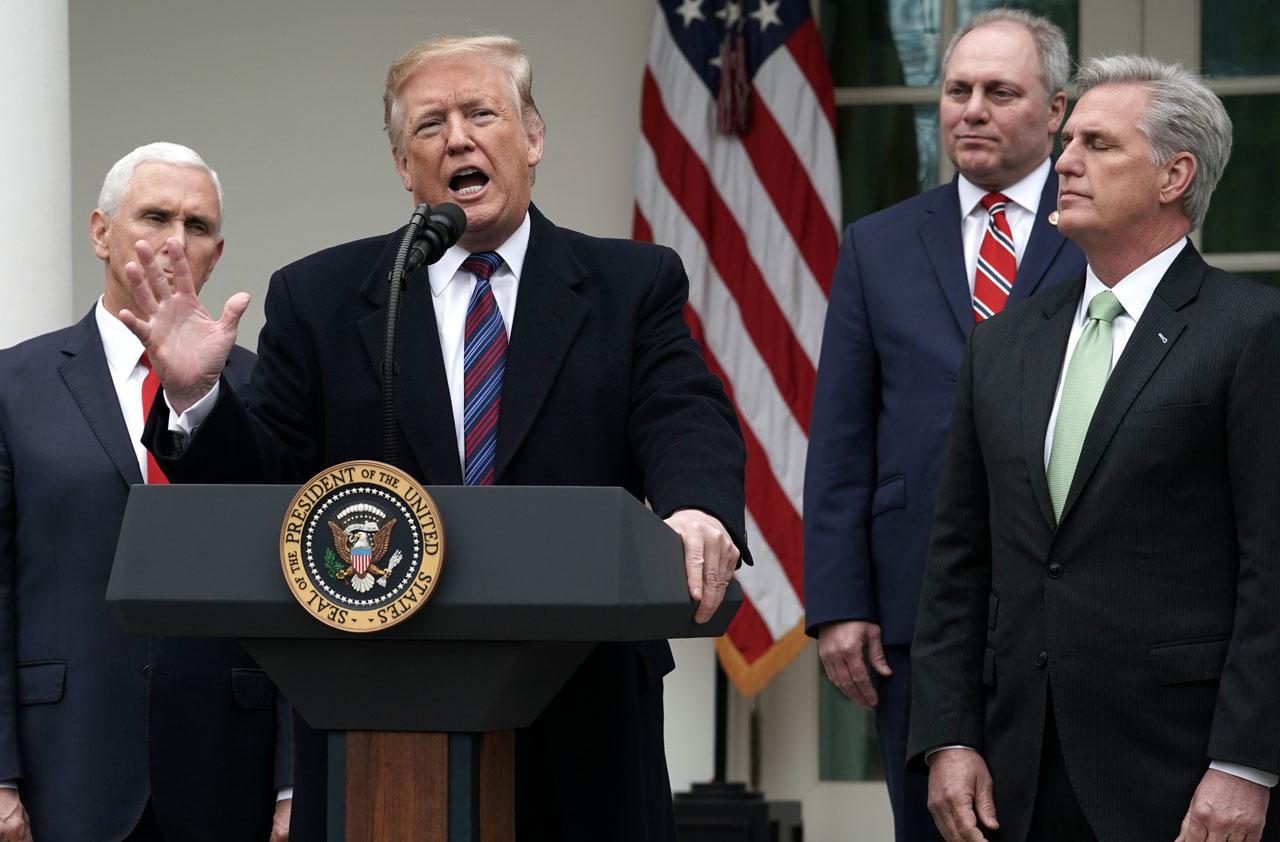More Shutdown Struggles Ahead for Divided Congress
Failure to pass a government funding bill by September 30 would trigger a shutdown of many federal services.


Profit and prosper with the best of Kiplinger's advice on investing, taxes, retirement, personal finance and much more. Delivered daily. Enter your email in the box and click Sign Me Up.
You are now subscribed
Your newsletter sign-up was successful
Want to add more newsletters?

Delivered daily
Kiplinger Today
Profit and prosper with the best of Kiplinger's advice on investing, taxes, retirement, personal finance and much more delivered daily. Smart money moves start here.

Sent five days a week
Kiplinger A Step Ahead
Get practical help to make better financial decisions in your everyday life, from spending to savings on top deals.

Delivered daily
Kiplinger Closing Bell
Get today's biggest financial and investing headlines delivered to your inbox every day the U.S. stock market is open.

Sent twice a week
Kiplinger Adviser Intel
Financial pros across the country share best practices and fresh tactics to preserve and grow your wealth.

Delivered weekly
Kiplinger Tax Tips
Trim your federal and state tax bills with practical tax-planning and tax-cutting strategies.

Sent twice a week
Kiplinger Retirement Tips
Your twice-a-week guide to planning and enjoying a financially secure and richly rewarding retirement

Sent bimonthly.
Kiplinger Adviser Angle
Insights for advisers, wealth managers and other financial professionals.

Sent twice a week
Kiplinger Investing Weekly
Your twice-a-week roundup of promising stocks, funds, companies and industries you should consider, ones you should avoid, and why.

Sent weekly for six weeks
Kiplinger Invest for Retirement
Your step-by-step six-part series on how to invest for retirement, from devising a successful strategy to exactly which investments to choose.
To help you understand what's going on in politics and what we expect to happen in the future, our highly experienced Kiplinger Letter team will keep you abreast of the latest developments and forecasts (Get a free issue of The Kiplinger Letter or subscribe). You'll get all the latest news first by subscribing, but we will publish many (but not all) of the forecasts a few days afterward online. Here’s the latest…
A fractured Congress will reconvene on September 2. A possible government shutdown awaits. Failure to pass federal funding for the new fiscal year, starting October 1, would shutter many agencies. And right now, lawmakers are far from agreement. The odds of a shutdown are less than 50%...For now. That may change.
Lawmakers are aware that shutdowns usually hurt both parties, politically, but they left Washington for summer break in a sour mood, with optimism for a deal waning. Democratic support in the Senate is needed to keep the government open, as 60 votes are required to pass annual appropriations bills.
From just $107.88 $24.99 for Kiplinger Personal Finance
Become a smarter, better informed investor. Subscribe from just $107.88 $24.99, plus get up to 4 Special Issues

Sign up for Kiplinger’s Free Newsletters
Profit and prosper with the best of expert advice on investing, taxes, retirement, personal finance and more - straight to your e-mail.
Profit and prosper with the best of expert advice - straight to your e-mail.
With the GOP controlling 53 seats, Democrats hold a key bargaining chip. Dems are under pressure to play hardball, as many in their base are still furious at the party for letting Republicans dictate the funding package last spring, which avoided a shutdown at the time. Democratic lawmakers feel they’re between a rock and a hard place. Supporting a Republican funding bill written without Dem input would enrage their base. Opposing such a bill would score political points, but risks triggering a shutdown and possibly getting the blame from voters.
Adding to the fraught mood on Capitol Hill is a GOP rescissions bill passed in July that clawed back $9 billion in funding previously OK’d by Congress, a move that President Trump pushed hard for. With the White House hinting it wants to enact another rescissions bill, Dems fear that any spending deals they broker with their GOP counterparts could be undone later. Privately, many Republicans are also uncomfortable with the concept of rescissions on the grounds that Congress, not the White House, holds the power of the purse. Such bills are historically rare.
Senate Minority Leader Chuck Schumer and Trump will play the key roles in heading off a shutdown. They reportedly have not spoken directly in months, and the tensions between the long-time New York foes appear to be escalating. A deal is possible if they break the ice, though Trump would get the better of it, as Republicans control Congress and most Hill Republicans are Trump loyalists.
We expect lawmakers to avoid a shutdown, somehow, some way, as the economy would temporarily suffer and Wall Street wouldn’t react kindly if funding runs out and most federal agencies go dark. Expect the agreement to keep nondefense 2026 spending equal to or less than this year’s level, though there will be exceptions, such as increased border security funding. Still, expect Congress to approve only a temporary funding extension that lasts a few weeks, as partisan disagreements and Trump’s tough bargaining make a year-long deal in September unlikely, kicking the shutdown threat down the road.
This forecast first appeared in The Kiplinger Letter, which has been running since 1923 and is a collection of concise weekly forecasts on business and economic trends, as well as what to expect from Washington, to help you understand what’s coming up to make the most of your investments and your money. Subscribe to The Kiplinger Letter.
Read more
- Congress Claws Back Another $20 Billion from the IRS
- How Social Security Would Be Affected By A Government Shutdown
- What Does a Government Shutdown Mean for Stocks?
- Donald Trump Tests His Limits
Profit and prosper with the best of Kiplinger's advice on investing, taxes, retirement, personal finance and much more. Delivered daily. Enter your email in the box and click Sign Me Up.

Sean Lengell covers Congress and government policy for The Kiplinger Letter. Before joining Kiplinger in January 2017 he served as a congressional reporter for eight years with the Washington Examiner and the Washington Times. He previously covered local news for the Tampa (Fla.) Tribune. A native of northern Illinois who spent much of his youth in St. Petersburg, Fla., he holds a bachelor's degree in English from Marquette University.
-
 Quiz: Do You Know How to Avoid the "Medigap Trap?"
Quiz: Do You Know How to Avoid the "Medigap Trap?"Quiz Test your basic knowledge of the "Medigap Trap" in our quick quiz.
-
 5 Top Tax-Efficient Mutual Funds for Smarter Investing
5 Top Tax-Efficient Mutual Funds for Smarter InvestingMutual funds are many things, but "tax-friendly" usually isn't one of them. These are the exceptions.
-
 AI Sparks Existential Crisis for Software Stocks
AI Sparks Existential Crisis for Software StocksThe Kiplinger Letter Fears that SaaS subscription software could be rendered obsolete by artificial intelligence make investors jittery.
-
 Trump $10B IRS Lawsuit Hits an Already Chaotic 2026 Tax Season
Trump $10B IRS Lawsuit Hits an Already Chaotic 2026 Tax SeasonTax Law A new Trump lawsuit and warnings from a tax-industry watchdog point to an IRS under strain, just as millions of taxpayers begin filing their 2025 returns.
-
 The New Fed Chair Was Announced: What You Need to Know
The New Fed Chair Was Announced: What You Need to KnowPresident Donald Trump announced Kevin Warsh as his selection for the next chair of the Federal Reserve, who will replace Jerome Powell.
-
 Trump Reshapes Foreign Policy
Trump Reshapes Foreign PolicyThe Kiplinger Letter The President starts the new year by putting allies and adversaries on notice.
-
 Congress Set for Busy Winter
Congress Set for Busy WinterThe Kiplinger Letter The Letter editors review the bills Congress will decide on this year. The government funding bill is paramount, but other issues vie for lawmakers’ attention.
-
 The December CPI Report Is Out. Here's What It Means for the Fed's Next Move
The December CPI Report Is Out. Here's What It Means for the Fed's Next MoveThe December CPI report came in lighter than expected, but housing costs remain an overhang.
-
 The Kiplinger Letter's 10 Forecasts for 2026
The Kiplinger Letter's 10 Forecasts for 2026The Kiplinger Letter Here are some of the biggest events and trends in economics, politics and tech that will shape the new year.
-
 Special Report: The Future of American Politics
Special Report: The Future of American PoliticsThe Kiplinger Letter Kiplinger assesses the political trends and challenges that will define the next decade.
-
 The November CPI Report Is Out. Here's What It Means for Rising Prices
The November CPI Report Is Out. Here's What It Means for Rising PricesThe November CPI report came in lighter than expected, but the delayed data give an incomplete picture of inflation, say economists.